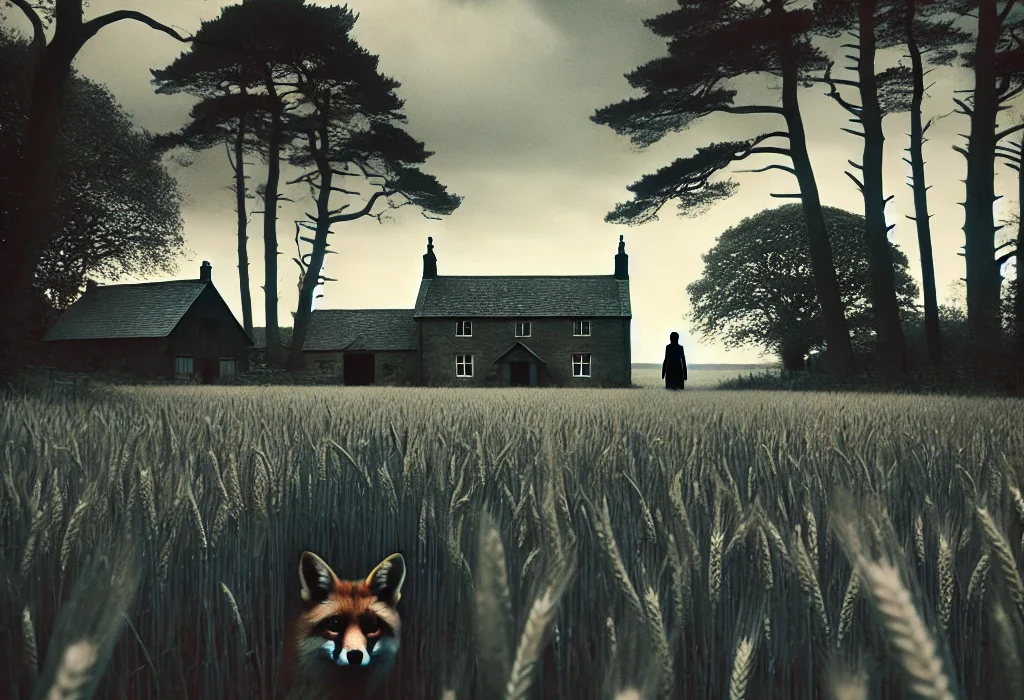The Fox by D.H. Lawrence, published in 1923, is a tale set in the rural English countryside during the aftermath of World War I. It explores the complexities of human relationships, the dynamics of power, and the mysterious interplay between human nature and instinct. The story delves into the lives of two women living in seclusion on a struggling farm, their encounter with a young soldier, and the ensuing emotional turmoil that disrupts their quiet existence.
Plot Summary
In the bleak English countryside, in the years following the Great War, two women, Nellie March and Jill Banford, live together on Bailey Farm. The war has left its mark on the world, and they are part of the scattered souls seeking solace in isolation. They have taken on the task of running the farm, intending to carve out a simple life by raising poultry. But nothing about their venture seems to prosper. The chickens they tend refuse to lay eggs, succumbing instead to strange illnesses, and the specter of a sly fox looms over them, stealing away the few hens they manage to raise. The farm, meant to be their sanctuary, becomes a place of quiet desperation.
March, the more robust and pragmatic of the two, takes on the heavy labor. Her breeches and belted coat give her the appearance of a young man, and her movements carry a certain grace and indifference. Her eyes are wide, dark, and contemplative, hiding an enigmatic soul that seems forever on the brink of a revelation. Banford, by contrast, is frail, delicate, a thin woman with spectacles that give her a bird-like appearance. She was the one who brought the initial investment into the farm, hoping to find health and fulfillment away from the clamor of the city. Their enterprise, however, is proving to be a failure. The daily struggle wears on them, and the constant threat of the fox serves as a grim reminder of their helplessness against the forces of nature.
One evening, as March stands watch over the yard, rifle in hand, she encounters the fox. It is there, in the long grass, staring up at her with eyes that seem to pierce into her very soul. There is a knowing look in its gaze, a brazen confidence that unsettles her. For a moment, they are locked in a silent communion, the wild creature and the woman, before the fox turns and vanishes into the woods. This encounter leaves March spellbound, the fox haunting her thoughts and dreams. It becomes a symbol of something deeper, a wild and untamed part of herself that she cannot quite grasp.
Days turn into weeks, and the shadow of the fox looms larger in March’s mind. She sees it in the corners of her vision, feels its presence in the rustle of the leaves and the shifting of the shadows. And then, one day, a new figure appears at their door. A young soldier, fresh from the war, stands before them, looking for his grandfather who once lived on Bailey Farm. His name is Henry Grenfel, and he is a presence both disarming and unsettling. He has the same sly, confident air as the fox, a quiet intensity that sets him apart.
Banford, with her natural warmth and hospitality, welcomes him into their home. But for March, his presence is a disturbance, a challenge to the fragile balance she has maintained. Henry watches her with a hunter’s eye, his curiosity acute and mocking. There is something predatory in his gaze, a quiet determination that unnerves her. He decides, almost immediately, that he wants to marry her, to make her his own, and he goes about this pursuit with the subtlety and patience of a predator stalking its prey.
March is drawn to him despite herself. His presence awakens something in her, a primal, instinctive response that mirrors the connection she felt with the fox. She is repelled by him and yet fascinated, caught in the web of his desire. Henry moves through the farmhouse with ease, asserting his dominance in small, subtle ways. He repairs things, shoots game for their table, and speaks to March in a soft, cajoling voice that she finds both infuriating and compelling.
The tension between them builds, a silent battle of wills. Henry pursues March with a relentless subtlety, his words a seduction and his touch a snare. He corners her one evening, asking her to marry him. His voice is low and insistent, wrapping around her like a net, pulling her towards him. March is caught in the moment, her defenses crumbling under the force of his will. She feels the pull of something dark and primal within her, something that resonates with the wildness she saw in the fox. In a daze, she says yes, not out of love, but out of a deep, unspoken need that she cannot name.
Banford is bewildered by this turn of events. She had not seen the danger coming, had not understood the silent struggle that had been unfolding in their midst. The farm, which had been their shared refuge, is now a battleground, the air heavy with unspoken tension. Banford watches helplessly as Henry takes over, his presence growing ever more oppressive. The fox that once haunted their nights has taken on human form, and there is no escape.
As the days pass, the atmosphere becomes more charged. Henry becomes more assertive, his actions more possessive. He hunts, not just the animals of the farm, but March herself, seeking to bind her to him completely. He is the fox, and she is his prey, caught in the snare of his desire. Banford, sensitive and nervous, feels the shift in the air but is powerless to stop it. She tries to intervene, to remind March of their bond, but the connection between the two women is no longer the same. March has been marked by Henry, claimed in a way that she does not fully understand but cannot resist.
Tragedy strikes when Banford is killed in an accident. It is an event that seems almost inevitable, the final act in the drama that has been playing out on the farm. With Banford gone, the last barrier to Henry’s control is removed. He stands over the farm like a conqueror, victorious and unchallenged. March is left with nothing but the echo of the fox’s cry in her mind, the haunting memory of what she has lost. The farm falls silent, the struggle over, but the scars remain, etched into the land and the soul of the woman who once lived there.
Main Characters
- Nellie March: A strong and independent woman, March is the primary laborer on the farm. She is introspective, mysterious, and has a deep connection with the natural world. Her encounter with the fox and later with Henry reveals a more primal, instinctive side of her character.
- Jill Banford: Frail and delicate, Banford provides the financial backing for the farm. She is warm and generous, but her health and nervous disposition make her reliant on March. Her presence offers a contrast to March’s more rugged demeanor.
- Henry Grenfel: A young soldier returning from the war, Henry is sly, confident, and predatory. He disrupts the lives of March and Banford, pursuing March with the determination and cunning of a hunter.
Theme
- Power and Domination: The story explores the dynamics of power, both in the human relationships and in the natural world. Henry’s pursuit of March mirrors the fox’s predatory behavior, highlighting the theme of dominance and submission.
- Instinct and Human Nature: Lawrence delves into the instinctual side of human nature, exploring how primal desires can override rational thought. March’s attraction to Henry is visceral, driven by an instinctive connection that she cannot fully understand or control.
- Isolation and Survival: The setting of the isolated farm serves as a backdrop for the characters’ struggle for survival. The harsh conditions and the constant threat of the fox symbolize the challenges they face in trying to maintain their way of life.
- War and Its Aftermath: The story is set in the shadow of World War I, and its impact is felt in the characters’ lives. The war has left them isolated, struggling to find meaning and connection in a world that has been irrevocably changed.
Writing Style and Tone
D.H. Lawrence’s writing in The Fox is rich and evocative, characterized by a deep psychological insight into his characters. His prose is laden with symbolism and metaphor, using the natural world to reflect the inner lives of the characters. The tone is brooding and intense, capturing the sense of impending doom that hangs over the story. Lawrence employs a lyrical and sensual style, bringing the reader into the minds of the characters and the physicality of their experiences.
The narrative is tightly woven, with a focus on the internal struggles of the characters rather than external events. Lawrence’s use of language is precise and deliberate, creating a sense of intimacy and immediacy. The writing evokes a sense of raw, primal emotion, reflecting the themes of instinct and human nature that run throughout the story.
We hope this summary has sparked your interest and would appreciate you following Celsius 233 on social media:
There’s a treasure trove of other fascinating book summaries waiting for you. Check out our collection of stories that inspire, thrill, and provoke thought, just like this one by checking out the Book Shelf or the Library
Remember, while our summaries capture the essence, they can never replace the full experience of reading the book. If this summary intrigued you, consider diving into the complete story – buy the book and immerse yourself in the author’s original work.
If you want to request a book summary, click here.
When Saurabh is not working/watching football/reading books/traveling, you can reach him via Twitter/X, LinkedIn, or Threads
Restart reading!








